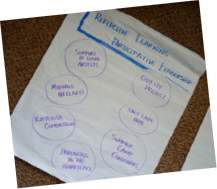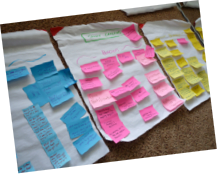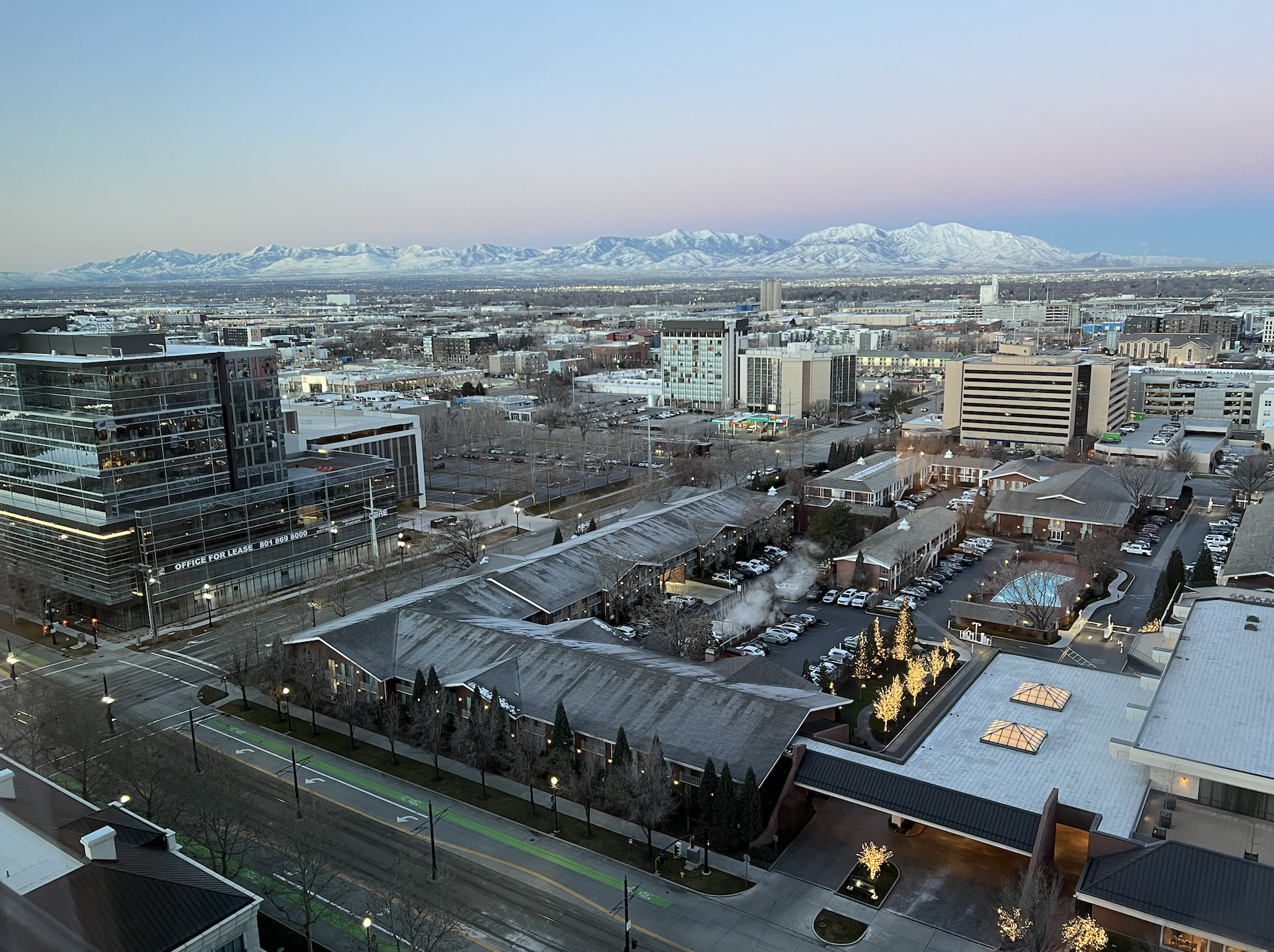Some of the story of the beginnings of this Community of Practice is at the bottom of this post. A group of lovely people, friends, and colleagues that started to find each other 15-18 months ago.
Though our pattern for meeting has been to focus on a particular project, meeting once per month for a two-hour evening, this month we met in a different way — in reflective learning for three hours to explore what we as a group know now about participative leadership that we didn’t know a year ago. To see what has become clear. To see a bit more of what we have been learning, practicing, and questioning. To learn through hearing and harvesting stories from those who have chosen to host one of our practitioners circles.
What follows below is an offering of harvest. To express some of the clarity that I experience by being with this group, using the words shared from our time together. To offer some of our CoP story to other CoPs meeting around the world, in hopes of adding to the learning and good that we do in these times of shift in leadership.
Our reflective learning night began with food. Yeah. Fruit, spring rolls, cookies, drinks and other offerings from people in the group. There were 14 of us for this night, meeting again in the offered space of the Holladay United Church of Christ.
I offered context to reinforce our purpose of reflective learning. My friend Glen Brown led us in check-in. He had set up a lovely and inviting center with a few cloths and a candle. I love his commitment to beauty. He invited us to place our cell phones in the middle (on silent), our hallowed devices for communication, so that we could tend with full attention to what we were doing as a group. We then passed a talking piece around the circle, responding to Glen’s invitation to speak a bit about anythi ng that distracts us that we want to let go of — so as to show up well together. Lovely.
ng that distracts us that we want to let go of — so as to show up well together. Lovely.
It was then time for stories. With a 10 minute time limit per group, I invited each of the people that had hosted groups (see BACKGROUND below) to begin to share some of their learning. They were invited to tell what they wanted. Some of these were projects in full bloom. Others were getting started. Others had started and struggled. All of these stories was welcomed. As prompts, each were invited to respond to these questions:
What was the background of your project?
Why did you choose to host a practitioners circle here?
What happened in the hosting of your project?
What surprised you?
What changed in you?
What changed in your group?
Two of us video recorded these stories (a bit tricky to hear with limits of an iPhone recording but extremely rich in content) while others from the group harvested on post-it notes some of the key questions, practices, and principles of participative leadership.
The videos are here. Enjoy theses as stories. To gather around the fire with. Some patterns of questions, practices, and principles that caught my attention in particular, are also below.
Questions — Though there were many questions that were specific to the stories of the projects, I was looking more for the pattern of important questions at the broader level of participative leadership. So, you could think of these as important questions to give attention to when teams and events are in the beginning planning stages:
-On Commitment and Scale…
What can we learn from what doesn’t happen?
How might we inspire ourselves and others into a bigger commitment?
From what does motivation really come (caring, interest…)?
What if trust is what helps to scale the work?
What if I didn’t need to do it by myself?
How can we further build momentum in a frenetic world?
-On Heart and Listening…
How can we further embody and encourage listening from the heart?
How does our listening further empower others and the group as a whole?
What is the power of connection that we could give attention too?
What surprised you?
– On Methodology…
How does the circle (or participation) change who is in charge?
How will we harvest at the end of the day?
How does circle (or participation) guide the timing of problem solving?
Practices — These are the things that I most look for. I’ve found that after a lot of learning through participative leadership, things can feel a bit muddy. What can shift that into something that works, is to give attention to practices. I think of them as the beginnings. Or the values to express and evo lve in support of the work. Fractals are a good teacher for me here. Rather than designing complex organizations, I find it very useful to think of acting from the simplicity of clear values and practices — this is what creates the complex and beautiful organizations that most people want.
lve in support of the work. Fractals are a good teacher for me here. Rather than designing complex organizations, I find it very useful to think of acting from the simplicity of clear values and practices — this is what creates the complex and beautiful organizations that most people want.
-On Harvesting…
Practices (of course)
Principles
Questions
-On Convening…
Use circle, and in particular, the fundamental invitation to turn to one another.
Prepare yourself by being clear in purpose and in your intention with the group.
-On Depth…
Share from your heart.
Welcome “not knowing.”
Invite story-telling.
Ask “what matters” and speak your truth from that perspective.
-On Partnering…
Seek partnerships.
Welcome diversity (or as we say at Berkana, “depend on diversity”).
-On Personal Grounding…
Be careful not to take what happens personally. (I have mixed feelings on this. The intent of this I believe is an ability to let go or give oneself to what emerges from the group. This is not to say that leaders don’t convene around a particular purpose. It is to say that there is a need to welcome surprise that comes from the interaction of the group around that particular purpose.)
Principles — These for me are the beliefs or commitments underneath the practices. Sometimes they can feel a bit like the same thing. For me, the principles are more enduring. The practices may change. For example, the principle might be to “convene regularly to share learning.” The practice might be “meet in circle” or it might evolve to something else specific to the needs of the group.
-Welcome a diverse group.
-The right people who are interested and motivated can make a big difference.
-There is a hunger for participation.
-Trust the group process. (I often modify this one to trust people in the group process.)
-Welcome fluidity (the magic of being in the moment).
-After diverging, be deliberate in converging, integrating, and adapting — to name what has happened.
-Work from the heart. (Simple isn’t it. Oft spoken. It is a lifetime invitation that yields much better results, even though seeming to be so soft.
Ah, rich. Pause. I invited people to notice and name patterns from what they were hearing in all of the stories. This was the bulk of our work and learning together for this night.
With thanks to all who participated in this reflective learning evening. As well as those who have come before but weren’t able to make it last week. And with welcome for the practicing we will continue to do together in support of ourselves and this Salt Lake Valley.
BACKGROUND / HISTORY FOR THIS COMMUNITY OF PRACTICE:
It was just over a year ago that my colleague, Kathy Lung, and I began convening people in the Salt Lake Valley to learn about participative leadership. We wanted to bring together friends, colleagues and strangers into a more deliberate network. We wanted to begin to create an environment to learn together. We wanted to improve the capacity that people had, ours and those we were meeting, to work on problems and dreams of this local community through the applied use of participative leadership.
Our start was to convene two half-day gatherings, open to anyone who wanted to show up. In total there were sixty of us. We explored together the beginnings of what participative could be, why it mattered to those in the room as a choice of leadership, and what was possible if we worked from a living systems perspective of participation in teams, organizations, and communities.
Our next was to begin to offer a rhythm of periodic half-day Saturday morning workshops (our beginning intention was a six month series with committed registration — it was difficult to find dates that worked for all, so we shifted to a less formal quarterly format). The first two were on the practice and way of being in Circle. Then on principles for creating healthy and resilient community. Then on Open Space Technology. Our last of the 2010 calendar was on Changing the World Through Play, with visiting friend and guest from Brazil, Edgard Gouveia Jr. of Elos Institute.
During the summer, after our first three morning workshops, my colleagues from the Salt Lake Center for Engaging Community, Jane Holt and Ben Mates, joined with me to begin to create a regular convening of a Community of Practice. We began with the commitment of meeting on the third Thursday evening of each month. We committed to two principles: 1) We would meet in the format of circle (with a welcome / context for the night, a presencing check-in, thinking together, harvesting, and a check-out). 2) We would focus on one project per meeting, invited and called by someone from the group, with focus on the participative leadership part of the project. The spirit of the Practitioners Circles has been that of Open Space sessions, invited from passion and responsibility. Whoever shows up are the right people, to offer help and support the groups learning in the moment.
Since then, we have had seven Practitioners Circles convened and harvested:
Support of Local Artists
Midvale Wellness Project
Working with Planners of a Youth Camp
Forming a SLC HUB
SLCEC Civility Initiative
Kayenta Compassion
Parenting in the Workplace Movement
Photos from our Reflective Learning Night
Download PDF of this learning.
